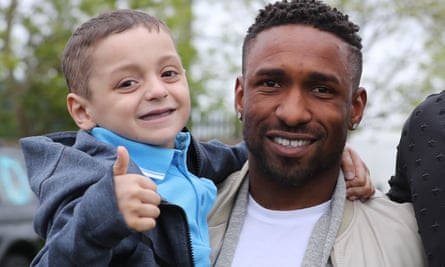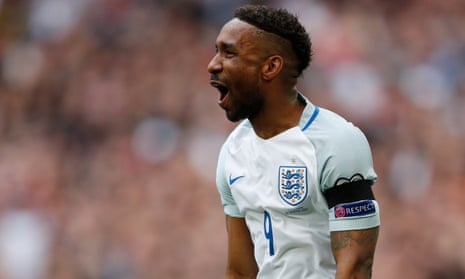It does not take Jermain Defoe long to roll back the years after walking back into a pocket of Dean Court. It was here where it all started for a raw, tenacious teenage striker looking to make his mark on loan from West Ham United in October 2000.
He scored on his debut against Stoke City and went on to equal a post-war record, scoring in 10 consecutive league games. “I remember every goal but my favourite was the chip against Oxford – that was special,” he says, beaming.
“I remember Harry Redknapp calling me into the office saying, ‘you’re going to Bournemouth’,” he says. “I was like, ‘where’s that’?’” He recalls his mother, Sandra, being so baffled by the move that she phoned Redknapp to ask why her 18-year-old son was being sent to the south coast to aide Sean O’Driscoll’s struggling side in the old Division Two.
He recalls Eddie Howe, then captain, and Jason Tindall “just kicking people” and admits the experience forced him to “toughen up quickly. Even back then he was a natural leader, somebody I looked at and thought that he’d go on to be a manager,” Defoe says of his new manager.
“Sitting here like this, I feel like a manager already,” he laughs, sitting in Howe’s chair in the media suite at the club’s stadium. “I’d love to [follow in his footsteps]. As you get older, of course you think on that sort of level. You always look at a manager and think, ‘I like the way you do this or the way you do that’ and if I was a manager I’d do the same. That is the way I am beginning to think. I would like to take my coaching badges and I would like to try and take a lot from Eddie this year.”
Seventeen years on, for Defoe this simultaneously feels worlds apart and eerily familiar: Howe, Tindall and five more from the team that played under O’Driscoll and Mel Machin that season are still at the club as part of the backroom staff.
“Normally you know some of the players but none of the coaches and you’ve probably just spoken to the manager,” he says. “It helps you settle in and relax a lot more.”
Tindall’s father, Jimmy, established the Senrab east London boys’ club, where Defoe, among others including Sol Campbell and John Terry, excelled before breaking into professional football. Jimmy would pick Defoe up and take him to training while at Bournemouth. Jason would cook them a pre-match meal at a house where the two lodged together close to Kings Park.
“We had toast, baked beans and spaghetti,” he says, shortly after his eyes light up at the thought of desserts made by his former landlady, Audrey Sullivan. “Jase was cooking. He would probably kill me for saying this … We used to go for a walk to the shop, come back, have the pre-match [meal] and then go together to the game.”
Redknapp, who lives in nearby Sandbanks, has already invited the 34-year-old around for dinner. Tindall, meanwhile, is the club’s assistant manager. Steve Fletcher, a bona fide club legend, is now the first-team coach. “Big Fletch used to flick everything down for me,” Defoe recalls, smiling.
Defoe, who flies out to Marbella for an eight-day training camp on Friday with his new team-mates, is visibly excited at his career coming full circle. Driving down to Bournemouth on Wednesday night, the striker said he was so excitable, he was “screaming in the car”.
The evergreen striker looks fresh-faced and believes – after signing a lucrative three-year contract at Bournemouth – he remains in great shape for club and country. He references yoga, the gym and the importance of the Cryotherapy chamber but does not underestimate his hard work and dedication. “I’m not perfect and I’m not an angel but I’ve always taken my football really seriously,” he says. Of his England hopes, Defoe has spoken to Gareth Southgate, whom he says is “delighted” with his summer move.

It must be said, though, that for much of this interview, football plays second fiddle. When asked about Bradley Lowery, the terminally ill Sunderland fan who idolises him, Defoe breaks into tears before sipping some water and taking two deep intakes of breath. “I’ve kept so much in because I’ve always been like that. In this industry as a footballer, you are [seen as] tough and stuff but I’m only human and it’s really touched me,” he says. “It’s been difficult to see him struggle how he has and there is nothing you can do.
“Every morning I wake up and check my phone and I know at some point I am going to get a message and it will be tough. It’s an important time for me with pre-season but there is more to life than football and just being with Bradley the other day and having the opportunity to spend time with him, it was special. I enjoyed that.”
Defoe speaks with the six-year-old’s family every day and they exchange messages. “I was away and did a little video for him,” he says. “He did one for me just before England played France. He did a message, which was nice. Even at this stage where he is in pain, he always seems to find a smile.”
But what did Bradley say about his move to Bournemouth? “He didn’t really say anything,” Defoe says. “I thought he was going to tell me off.”
